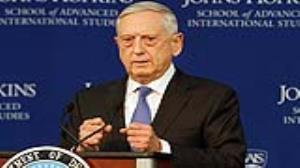MODERATOR:Thank you for your remarks, Secretary Mattis. My name is Katherine Standbridge. I'm a second-year M.A. student here at SAIS, and I'll be reading the questions that have been submitted by the audience.
So our first question:"Building capability and capacity are challenging to achieve at the same time. Do you see one of these as being more important in the near term?"
SEC. MATTIS:Yes. Very good question.
So capabilities are what does the force bring? And you look at every capability in a force, you look at changing times, what are the threats. We try to define the threats to what I would call a Jesuit's level of satisfaction, which is tough indeed. And at that point, we then determine, do we need additional capabilities?
Then you have capacity. In other words, how big is the force that you have.
I believe, at this time, in this age, that emphasizing the capabilities that the force brings is probably the predominant effort that you've got to make.
At the same time, capacity, the size of your force, makes a difference. There are nations that have stood by us for years and to whom we look many times for support. And some of those forces have been shrunk to a point that they no longer allow their diplomats to speak with strength.
So we have to make certain we keep a force of sufficient size. But my emphasis right now is on building the capacity. Do we have the cyber troops in there? Do we have the intelligence analysts in there that allow us to be at the top of the game when we make that grave choice to send our young folks into the -- into a fight?
MODERATOR:Thank you.
Next question:How does the NDS intend to modernize U.S. forces and prepare the U.S. for a conflict with some of the world's rising powers?
|

